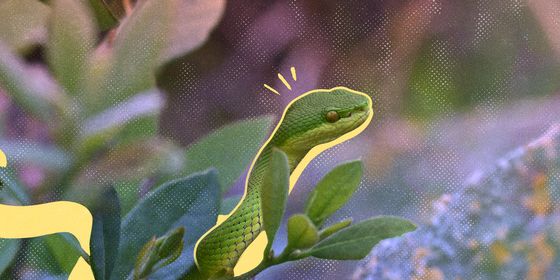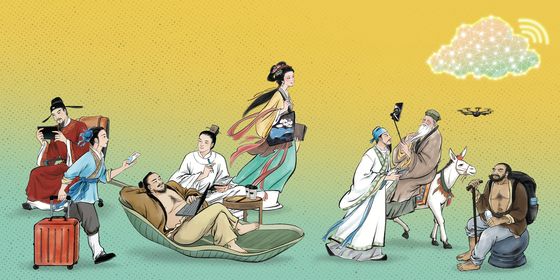Cattle-related idioms for the Year of the Ox
The Year of the Ox is nearly upon us, and Chinese are wishing each other “Happy 牛 (niú, ox) Year!”—a play on the pronunciation of 牛 (niú) and the English word “new.”
In Chinese culture, the ox symbolizes diligence and dedication: those who serve others wholeheartedly are referred to as “old yellow oxen (老黄牛 lǎo huángniú).” Throughout Chinese history, tales related to oxen have been recorded and summarized into chengyu, some of which we introduce below:
庖丁解牛 páodīng-jiěniú
A skilled cook dismembering an ox
Zhuangzi, the famous Daoist text from the Warring States period (475 – 221 BCE), contains the story of a cook preparing a meal of ox meat for King Hui of the State of Wei. The chef was so skilled that he made the sound of cutting and slicing sound like music. The king was enchanted, and asked what his secret was.
The cook answered: “When I first began to cut up the ox, what I saw was only a whole ox. Three years later, I no longer saw the entire ox”—that is, he now only saw the cuts of meat the ox would become. “I sense the ox in my mind instead of seeing the ox with my eyes. A good cook changes his knife every year, because they use their knives to cut the meat; an ordinary cook changes his knife every month, because they use their knives to chop the bones. But I have used my knife for 19 years and have cut thousands of oxen, but its edges are as sharp as when it was new. That’s because there are crevices in the joints of the ox, and the blade of the knife is thin. I used the blade without thickness to cut along the joint where there are crevices, there is more than enough room for the knife there.”
The story became so famous that it birthed three different idioms: 游刃有余 (yóurèn-yǒuyú, plenty of room for the blade to enter), describing completing a job skillfully and with ease; 目无全牛 (mùwú-quánniú, see an ox not as a whole but as cuts of meat), meaning one is extremely skilled at something; and 庖丁解牛, which encapsulates the whole story and refers to doing something with great expertise. For example:
Since he took over this case, he has solved every problem with ease, just like a skilled butcher cuts up an ox.
Zìcóng tā jiēshǒu le zhège zhuān’àn yǐhòu, biàn rútóng páodīng-jiěniú yìbān, suǒyǒu wèntí dōu yíngrèn’érjiě.
自从他接手了这个专案以后,便如同庖丁解牛一般,所有问题都迎刃而解。
对牛弹琴 duìniú-tánqín
Play the lute to an ox
In the Warring States period, so a fable goes, there was a magnificent lute player named Gongming Yi (公明仪). One day, he took his instrument to the outskirts of the city, where he saw an ox eating grass. He approached the beast, and played his favorite song for it—but the ox didn’t react to the music at all.
On hearing the story, people pointed out that a draft animal couldn’t be expected to understand music. Later this chengyu was used to describe people who express their thoughts or ideas to the wrong audience, similar to the English idiom “pearls before swine.” For example:
I spent the whole afternoon talking about film and literature with him, but it turned out I was playing the lute to an ox.
Wǒ huā le yí xiàwǔ gēn tā liáo diànyǐng hé wénxué, jiéguǒ què shì duìniú-tánqín.
我花了一下午跟他聊电影和文学,结果却是对牛弹琴。
牛刀小试 niúdāo-xiǎoshì
Try the ox-slaughtering knife
The Analects of Confucius records a conversation between Confucius and his student Ziyou (子游), who worked as an official in Wucheng in the State of Lu during the Zhou dynasty (1046 – 256 BCE). Ziyou followed Confucius’ teachings, and promoted rites and music as part of education for the people. But one day, when Confucius visited Wucheng and found the town full of music, he criticized Ziyou: “To govern such a small place like Wucheng, it’s not necessary to use rites and music. If you wanted to kill chicken, would you use a knife fit for slaughtering an ox?”
Since then, an ox-slaughtering knife has been used as a metaphor for great talent or ability. Later, during the Song dynasty (960 – 1279), scholar Su Dongpo (苏东坡) wrote in a poem to his friend, who was heading off to serve an official post in a far-off place: “After reading countless books, you go to such a humble place just to try your ox-slaughtering knife. (读遍牙签三万轴,欲来小邑试牛刀).” This developed into the chengyu 牛刀小试, used to describe a master giving just a small demonstration of their skill. For example:
He is the best student in the school. For him, taking such an exam is like trying out his ox-slaughtering knife.
Tā shì xuéxiào li zuì yōuxiù de xuéshēng. Duì tā lái shuō, cānjiā zhèyàng yí gè kǎoshì búguò shì niúdāo-xiǎoshì.
他是学校里最优秀的学生。对他来说,参加这样一个考试不过是牛刀小试。
牛角挂书 niújiǎo-guàshū
To hang books on an ox’s horns
During the Sui dynasty (581 – 618), a 15-year-old scholar named Li Mi (李密) became a low-ranking official in the imperial palace. But when Emperor Yang became aware of this, he dismissed Li, believing he was too young to hold such a position.
Li left the court and made a living herding cattle instead, but he didn’t give up studying. Every day, he would sit on the back of one of his oxen and read books. One day, Yang Su (杨素), a high-ranking official, observed Li riding an ox with the Book of Han (a classic book on the history of the Han dynasty) hanging from the ox’s horn on a string. Yang was deeply moved by the young man’s diligence, and predicted that in the future, Li would become even more successful than his own privileged sons.
The story was summarized into a chengyu meaning to be a diligent student, though it is no longer used much in daily conversation. Li later led a rebellion against the tyranny of the Sui government, though he was ultimately unsuccessful.
Cover Image from VCG












